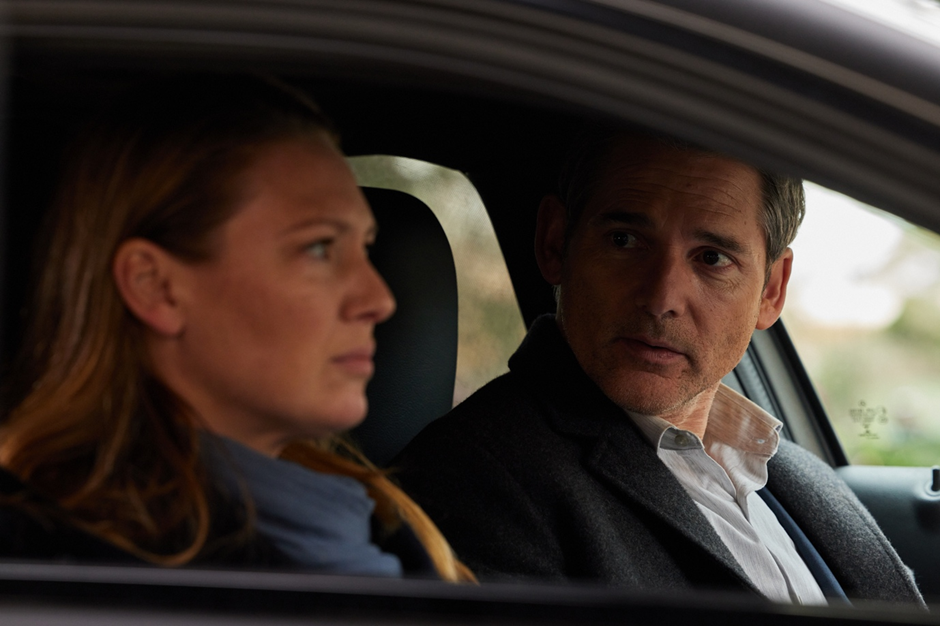Force of Nature: The Dry 2 Offers a Compelling Mystery with Little Thrills
- jacksonrobb00
- Feb 8, 2024
- 4 min read
Nature holds us all to account. Going for a hiking retreat over a weekend in the woods may sound like fun, even if it means dealing with your colleagues, but underneath, there’s always something going on with you and who you’re with. When plans go awry and tensions simmer and boil, everyone’s true colours surface and any chances of recovering friendly pretences are no longer possible. No matter what you’ve done or you hide, you’re forced to confront terrible truths about yourself, especially when nature strips and renders you vulnerable.
That’s what Force of Nature: The Dry 2 covers with its change in setting. Gone are the droughts surrounding a small, underclass Australian town, for this sequel instead places us in the unpredictability of its perilous settings. Noticeably, rainstorms and waterfalls are present, but rather than creating cathartic relief, they add to the danger. While these elements fit into Force of Nature’s rather muted mystery, it’s too bad that its rich atmosphere cannot support an uninvolved narrative.
When a corporate hiking retreat in the Victorian mountains goes wrong, resulting in the disappearance of female employee Alice (Anna Torv) and the traumatised return of four other employees (Deborra-Lee Furness, Robin McLeavy, Sisi Stringer, Lucy Ansell), federal agents Aaron Falk (Eric Bana) and Carmen Cooper (Jacqueline McKenzie) are sent to investigate. Complicating matters is that Aaron worked with Alice, a whistleblowing informant pressured into acquiring evidence of embezzlement and money laundering from her boss, Daniel Bailey (Richard Roxburgh). While Aaron hides this, so do the suspects as the harrowing circumstances of their retreat become revealed through flashbacks. The further Aaron investigates, it forces him to revisit his childhood trauma of his mother’s disappearance – and subsequent death – in these same mountains and the possible link of an unknown serial killer that targeted women for years.
It took me two viewings of Robert Connolly’s The Dry to appreciate what it was going for. It didn’t resist clichés entirely, but it stood out amongst its peers in the modern Australian cinema canon by telling a compelling mystery and supporting it with its bleak atmospherics, even if it got lost with its somewhat convoluted use of flashbacks. The Dry is a painful watch because it crafts an atmosphere evocative of guilt, tragedy and misery, where the past irrevocably looms over the present, and not even a resolution could offer a hopeful catharsis. It may have felt unsatisfying, but it felt powerful and fitting to the narrative.
Where Force of Nature struggles is how it doubles down on its narrative flaws. Flashbacks are necessary devices to convey crucial information while also recontextualising the plot that your audience is invested in. However, when it constantly switches between flashbacks and features at least three timelines to present, you risk unnecessarily complicating and losing balance in your narrative. It’s not borderline incomprehensible, but the present timeline gradually loses intrigue because of how uninvolved it feels, and because the present is necessary to uncover the past, that decreased investment results in less tension and less satisfying answers to discover.
One particular narrative flaw is how Force of Nature introduces a compelling side mystery regarding the disappearance of multiple women and an unknown serial killer in these mountains, whose shack and graveyard are discovered, only to do very little with it. The lack of answers – and the resulting ambiguity – is not the issue here, but rather how it rarely links to the central narrative. You can argue it’s a huge red herring, a way to keep the audience guessing, but without much to say in that area, Force of Nature loses focus, and that subplot feels more like an awkward detour than anything.
That’s not to say Force of Nature isn’t well-made. With Connolly returning in the director’s chair, his rich atmospherics carry over to Force of Nature, and those are fortunately able to accommodate the change in setting. From a detailed sound design to the richly filmed naturalistic locations, there’s a sense of beauty and danger created in Force of Nature’s environments, which fittingly enhance any tension. When it loses track of geography, that’s because its characters get lost, so it’s excusable. Even the darker lighting makes the limited visibility of its images more frightening. But it’s still strange how inert the experience feels, especially when the repetition of Peter Raeburn’s score distracts more than it engages.
Force of Nature’s ensemble cast is good at what they work with. Reprising his role from The Dry, Eric Bana successfully brings nuance and subtlety to his character arc again, where repressed feelings of guilt almost surface in his reactions. Anna Torv is a particular highlight, playing as a whistleblower and mother forced into a morally difficult situation and facing the dilemma of doing the right thing while trying to do what is best for her daughter. Torv navigates those conflicted emotions at ease, making her performance so believable that you worry for her character’s fate. Everyone else (Deborra-Lee Furness, Robin McLeavy, Richard Roxburgh) delivers solid performances that keep you guessing whether any of their characters are guilty or not.
But when all is said and done, Force of Nature’s strong setup leads to an underwhelming conclusion. No matter how cinematic the experience is, it’s hard not to feel numb when there aren’t many interesting decisions on display, and its mystery is let down by its undercooked screenplay. Whilst Force of Nature may be a solid piece of Australian cinema and tries something different with its change in setting, it most certainly feels drier than its predecessor.
Rating: ★★★☆☆
Force of Nature: The Dry 2 is now playing in Australian cinemas.








Comments